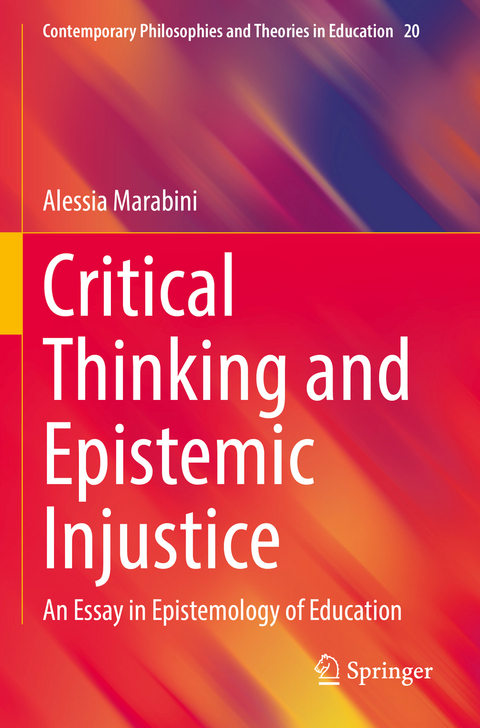
Critical Thinking and Epistemic Injustice
Springer International Publishing (Verlag)
978-3-030-95716-2 (ISBN)
This book argues that the mainstream view and practice of critical thinking in education mirrors a reductive and reified conception of competences that ultimately leads to forms of epistemic injustice in assessment. It defends an alternative view of critical thinking as a competence that is normative in nature rather than reified and reductive. This book contends that critical thinking competence should be at the heart of learning how to learn, but that much depends on how we understand critical thinking. It defends an alternative view of critical thinking as a competence that is normative in nature rather than reified and reductive. The book draws from a conception of human reasoning and rationality that focuses on belief revision and is interwoven with a Bildung approach to teaching and learning: it emphasises the relevance of knowledge and experience in making inferences.
The book is an enhanced, English version of the Italian monograph Epistemologia dell'Educazione: Pensiero Critico, Etica ed Epistemic Injustice.
lt;p>Alessia Marabini is a high school professor in Italy and a member of Centre for Knowledge and Society (CEKAS) at the University of Aberdeen. She graduated with a BA (Laurea) in Philosophy of Language and a PhD in Mind, Language and Logic at the University of Bologna. Her areas of research are epistemology and philosophy of education. In epistemology of education, she has contributed to the debate with articles published in the Journal of Philosophy of Education. She has also given talks at the Universities of Seattle, Chicago, Calgary, Oxford, MGU Moscow, Venezia, APA in Boston and UCL Institute of Education. She has published various monographs, in Italian including La Concezione Epistemica dell'Analiticità: un Dibattito in Corso (The Conception of Epistemic Analyticity: An Ongoing Debate) 2013 (Aracne: Rome), and Epistemologia dell'Educazione: Pensiero Critico, Etica ed Epistemic Injustice (Epistemology of Education: Critical Thinking, Ethics and Epistemic Injustice) 2020 (Aracne: Rome).
Chapter 1. Introduction.- Chapter 2. Reasoning.- Chapter 3. Ethics, education, and reasoning.- Chapter 4. Critical Thinking and Epistemic Value.- Chapter 5. Critique of Critical Thinking: Bildung and the Value of Critical Thinking.- Chapter 6. Critical Thinking and Education Injustice.- Chapter 7. Conclusions. Education injustice and critical thinking between Bildung, cultural heritage and recognition.
| Erscheinungsdatum | 25.03.2023 |
|---|---|
| Reihe/Serie | Contemporary Philosophies and Theories in Education |
| Zusatzinfo | XIX, 225 p. 1 illus. |
| Verlagsort | Cham |
| Sprache | englisch |
| Maße | 155 x 235 mm |
| Gewicht | 385 g |
| Themenwelt | Geisteswissenschaften ► Philosophie ► Erkenntnistheorie / Wissenschaftstheorie |
| Sozialwissenschaften ► Pädagogik ► Bildungstheorie | |
| Schlagworte | Abduction • Belief Revision • Bildung • Competence Based Education • Constructivism • critical thinking in Education • Direct Instruction Theory • discovery learning • epistemic injustice • Epistemology of Education • Inferentialism • Minimal guided approach • Non-monotonic norms • Philosophy for Children • Philosophy of education • PISA Test • Rational Imagination |
| ISBN-10 | 3-030-95716-0 / 3030957160 |
| ISBN-13 | 978-3-030-95716-2 / 9783030957162 |
| Zustand | Neuware |
| Haben Sie eine Frage zum Produkt? |
aus dem Bereich


![Was heißt Denken?. Vorlesung Wintersemester 1951/52. [Was bedeutet das alles?] - Martin Heidegger](/media/113619842)